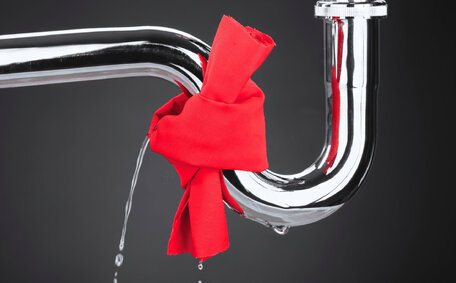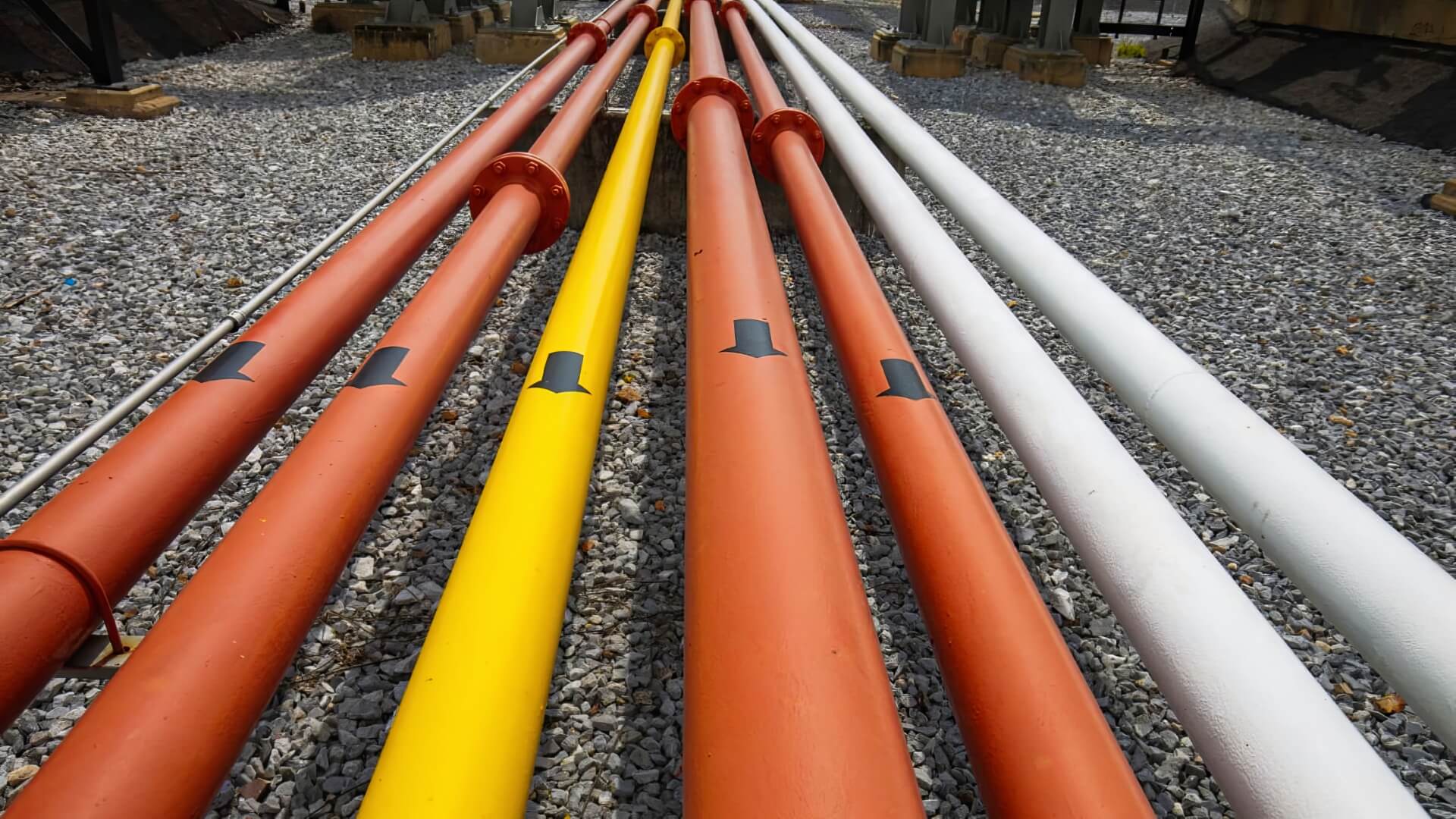Introduction to Common Plumbing Pipes
Understanding the expected lifespan of plumbing pipes in your home is crucial for effective maintenance and future planning. Each type, like copper, offers different durability and factors that may impact its lifespan.
We’ll explore the average lifespans of various plumbing pipes – galvanised steel, copper, PVC, PEX, and cast iron – and discuss when to replace lead pipes. By learning about the lifespan of different pipe materials, including Type M copper tubing, you can make informed decisions about any replacements or repairs needed in your home’s plumbing.
Understanding the life expectancy of copper piping helps prevent leaks and bursts, and foresight with supply pipes averts future issues. Understanding the life span of your pipes lets you proactively maintain them and address issues before they escalate into costly emergencies. Continue reading to learn about the lifespans of various plumbing pipes.
Galvanized Steel Pipes
Traditional appliances like cast iron water heaters typically last 20 to 50 years before they start to corrode and pit internally.
However, as their corrosion resistance fades with age, the pipes your home has may need to be replaced. By 50 years, full perforation often occurs, which can cause leaks.
For optimal pipe condition, new galvanised steel pipes should be thoroughly flushed to eliminate manufacturing debris.
Water quality can significantly impact the durability of your water supply. Since hard water can cause scale build-up and corrosion, shortening pipe lifespan, it’s vital to maintain your water softening system. Acidic, soft water corrodes from inside.
Galvanised steel pipes in your home, which pipes need replace after 35-40 years, fare well on average with regular, properly executed maintenance like flushing. But with factors like hard water, corrosion and manufacturing flaws, 50 years is the maximum. Pipes usually last and function effectively for many years but may demonstrate issues such as leaks, corrosion, and reduced flow as they age.
We recommend keeping an eye on the condition of your pipes and contact Wetherill Park Plumbing for a pipe longevity inspection if your galvanised pipes surpass 20 years in your home. Our plumbing services can advise if replacement is needed and provide options to maximise the life of your new plumbing pipe.
Plastic Pipes (PVC, CPVC, PEX)
Plastic pipes such as abs pipes, PVC and PEX have become a popular choice in modern plumbing systems due to their flexibility, durability and longevity.
PVC pipes, commonly used in plumbing, offer resilience that should extend their usefulness for generations.
PVC pipes are renowned for their durability, with a potential lifespan of up to 100 years when properly manufactured and installed due to their resistance to corrosion and suitability for hot and cold water.
It shares the same corrosion resistance of PVC.
CPVC pipes can withstand higher temperatures, safely conveying hot and cold water up to 93°C.
PEX pipes, made from cross-linked polyethylene, offer high flexibility and a design that resists corrosion and chemicals, ensuring a minimum 50-year lifespan. Homeowners can expect PEX pipes to be excellently suited for radiant floor heating and air conditioning systems, with a lifespan extending over 50 years.
However, be mindful that rodents have a propensity to gnaw more readily on PEX than other types of pipes. Due to its flexibility, it is popular for its ease use in installation around corners and angles.
Talk to our team at Wetherill Park Plumbing, one most knowledgeable in the industry, to learn which plastic pipe options may be best for your home’s plumbing needs.
Cast Iron Pipes
Cast iron pipes, integral to your home’s sewer system and drain lines, are known for their durability and longevity. With proper care, cast iron drain lines have a lifespan commonly ranging from 75 to 100 years.
Cast iron pipes, a blend of steel and iron, are resistant to rust and corrosion, offering a lifespan that often exceeds 50 years. Interior mineral deposits in cast iron pipes can also serve as a protective layer against further corrosion.
Despite their tendency to crack under pressure, cast iron pipes are highly durable and can endure with proper care. Rooter plumbing intrusion into your sewer is another common concern, particularly if your house was constructed with susceptible joints and cracks that become magnets for roots, eventually causing clogs and breaks. If your dwelling was built before the 1960s, it’s highly probable that cast iron sewer lines are part of its construction.
If signs of wear on your original cast iron sewer line like reduced water flow, leaks, or rust stains become evident, consider pipe replacements. When should you consider a professional drain cleaning to ensure you don’t need to replace your compromised pipes? Regularly schedule drain cleanings every 1-2 years to remove mineral deposits and monitor for blockages. Overall, cast iron provides excellent longevity for drain lines with proper maintenance.
Factors Affecting Lifespan
Several key factors significantly influence the longevity of plumbing pipes, such as:
Water Composition
Mineral content and pH balance of your water are crucial factors that distinctly impact pipe integrity. Hard water with high mineral content can lead to scale buildup and corrosion in pipes over time. To prevent corrosion from acidic water, make sure your pH levels are monitored to protect pipes.
Water Pressure
Consistently high water pressure can overload your water heaters, which might affect how long your water heaters last, causing stress to pipes and joints, leading to leaks that reduce lifespan. Water hammer from abrupt pressure changes also damages pipes.
Installation Quality
Proper installation, which can used to replace improper practices, is essential to ensure pipes last their full lifespan according to manufacturer specifications. Poor joins, improper support and misaligned pipes contribute to early failure.
Pipe Material
As outlined above, certain materials like cast iron and PVC plastic pipes made to last can endure 50-100 years, while pipes like galvanised steel may need replacing after 20-50 years.
Usage Patterns
Frequent use of heating lines or washing machine drains can accelerate deterioration due to wear and tear. Shutting off unused areas of plumbing can prolong lifespan.
Temperature Fluctuations
Freezing temperatures and exposure to sunlight degrades pipes more quickly. Maintaining steady temperatures prolongs lifespan.
Comprehending these aspects and their impact can help homeowners take steps to maximise the lifespan of their plumbing components. Make sure to apply an ounce of prevention - routine maintenance helps avoid major pipe failures down the road.
Replacing Old Pipes
There are a few key signs that indicate it’s time to replace old plumbing pipes:
Frequent Leaks or Pipe Bursts
Should you notice any recurrent leaks or bursts in specific pipes, it might be time replace these worn-out sections.
Reduced Water Flow
Noticeable reductions in water pressure and flow can indicate buildup and corrosion in old copper lines, requiring attention and possible replacement.
Discoloured or Rusty Water
Rusty, brown, or discoloured water could indicate corrosion in your copper piping, signalling a need for replacement.
Loud Noises
Frequent banging or hammering sounds can indicate loose fittings or mineral buildup in worn pipes that need replacing.
High Utility Bills
Leaks in deteriorating pipes, allowing water to escape undetected, can result in unusually high water bills.
To prevent unexpected failures, including issues with tank water heaters, be proactive in replacing pipes close to the end of their lifespan. This prevents extensive water damage and costly emergency plumbing repairs down the road.
For your home’s plumbing health, contact Wetherill Park Plumbing for an inspection if your pipes are over 20 years old. If you suspect compromised pipes, our licensed professionals can assess their condition and advise on whether replacement is necessary.
We offer pipe replacement services for all types of plumbing components, ensuring homes and businesses benefit from top-quality materials that will last for decades. Investing in new pipes now protects your property and gives you peace of mind.
Avoid emergencies – contact Wetherill Park Plumbing immediately at 1300 349 338 or via jobs@wetherillparkplumbingservices.com.au for a pipe inspection and replacement quote.






